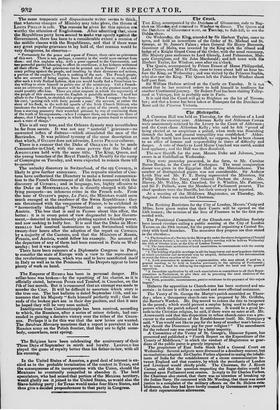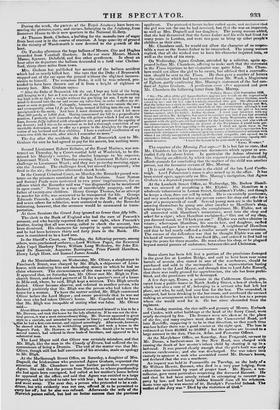The Revising Barristers for the City of London, Messrs.'Craig and
Milne, have given notice that their Courts will be opened on the 15th instant ; the revision of the lists of Freemen to be the first pro- ceeded with.
The Provisional Committee of the Church-rate Abolition Society
have issued circulars calling a public meeting at the City of London Tavern on the 19th instant, for the purpose of organizing a Central So-
ciety with local branches. The measures they propose are thus stated in the circular-
" 1. The formation of a Society in the Metropolis under the above desiguation(ChurchE rate Abolition Society), in order to which a public meeting will be held on Wednesday the 12th of October next, at the City of London Tavern. " 2. The immediate institution or local associations, to communicate with the society formed. in London. "3. The holding of public meetings in all the large towns and more-populous districts, at which resolutions and memorials may be adopted, declaratory of the determination to resist the future exaction of the rate. " 4. Each association to nominate a representative, who may attend, if need be, a general meeting. to be held in London previously to the opening of Parliament ; and to raise a fund for defraying the expenses of both the local and the general opposition.
• 5. Immediate application by all such associations or committees to all their Repre- sentatives in Parliament, to give their aid in procuring the total abolition of the Church-rate without commutation.
" 6. Firm, peaceable, consentaneous, passim resistance to the paymeat of this unjust impost."
Hitherto the opposition to Church-rates has been scattered and un- certain: in future it will be a combined and more effectual resistance.
The Vestry of St. George the Martyr's parish assembled on Thurs- day; when a threepenny church-rate was proposed by Mr. Griffiths, the Rector's Warden. Mr. Day moved to reduce the rate to twopence in the pound; which would prevent a surplus being used to defray ex- penses which the parish refused to sanction. It would be a great be- nefit to the Christian religion, he said, if there were no rates at all. Mr. Arrowsmith said that this disposition to refuse church-rates was a pre- cursor to the annihilation of the Establishment itself. Mr. Humphrey `48 said, "You would not like to pay for the keep of another man's horse— why should the Dissenters pay for your religion ? " The amendment for the reduced rate was carried by a large majority.
A Committee of the Vestry of St. George's, Hanover Square, has presented and published a " Fourth Report on the Expenditure of the County of Middlesex," in which the conduct of Magistrates as guar- dians of the public purse is gravely impugned.
The proprietors of East India Stock held a General Court on Wednesday. Several subjects were discussed in a desultory manner, but no resolutions adopted. Sir Charles Forbes objected to taxing the inhabi- tants of India for the establishment of a steam communication be- tween England and that country, by which the merchants of London and Liverpool would chiefly profit. The Chairman, Sir J. Rivett Carnac, said that the question respecting the Sugar-duties would be pressed smon Parliament next session. In reply to Sir Charles Forbes, the Chairman also stated, that there was no intention of breaking up the Indian Navy. He concurred with Mr. Weeding, that there was some justice in a complaint of the military officers on the St. Helena ester blishment, that they had been hardly treated by Government in respect of their superannuation allowances.
During the week, the porn rs of the Royal Academy have been re- moving the pictures, casts, and statues, belonging to the Academy, from Somerset House to their new quarters in the National Gaiety.
At Thames Bank, Chelsea, a building for the manufmture of sugar from beet-root is in the course of erection. A large quatnity of ground in the vicinity of Wandsworth is now devoted to the glowth of the beet. On Tuesday afternoon the huge balloon of Messrs. Gye and Hughes ascended from Vauxhall Gardens. In the car were Messrs. Monck Mason, Spencer, Delafield, and five other gentlemen. In about an hour after its departure the balloon descended in a field near Chehalis- ford, thirty-three miles from town.
Mrs. Graham has published her account of the balloon accident which had so nearly killed her. She says that the Duke of Brunswick stepped out of the car upon the ground without the slightest inconve- nience to himself. The veracious Duke, it will be renit inhered, pre- tended to have been thrown out of it from a heit;ht of eighteen or twenty feet. Mrs. Graham says-
" After the Duke of Brunswick left the car, I kept my hold of the hoop, still hanging to it ; but as I was aware of the danger of the balloon ascending
too high with so light a weight without the gas being let out, I made op my
mind to descend into the car and secure my valve-line, in order to effect my de- scent as soon as possible. Unhappily, however, my feet were outside the car ; and consequently, when I /ft go the hoop, instead of falling into the car, I was precipitated to the earth. And here I utust distinctly state that I fell more than 300 yards, or 1,000 feet. Having commenced my fall in a perpendicular position, I perfectly well remember that the silk pelisse which I had on at the time, became fidqy inflated with atmospheric air, and prevented the tepidity of my descent ; au a I was so far conscious as to feel a thorough conviction of my inevitable destruction, and to offer up a prayer to the Almighty for the preset-. vation of my husband and dear children. I have a confused recollection of my concussion with the earth, after which I remember no more."
The day after the accident, the Duke of Brunswick sent to Mr. Graham the sum he had agreed to pay for his ascent, but nothing more.



























 Previous page
Previous page